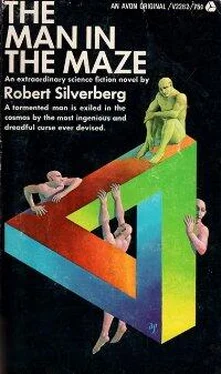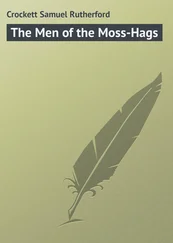“I’m afraid I wouldn’t, Ned. But we can discuss this some other time. Say, twenty years from now. Is it a date?”
Trying to grin, Rawlins said, “Sure. If I haven’t killed myself from guilt over this.”
“You won’t.”
“How am I supposed to live with myself after I’ve pulled Dick Muller out of his shell?”
“Wait and see. You’ll discover that you did the right thing, in context. Or the least wrong thing, anyhow. Believe me, Ned. Just now you may feel that your soul will forever be corroded by this job, but it won’t happen that way.”
“We’ll see,” said Rawlins quietly. Boardman seemed more slippery than ever when he was in this avuncular mood. To die in the maze, Rawlins thought, was the only way to avoid getting trapped in these moral ambiguities; and the moment he hatched the thought, he abolished it in horror. He stared at the screen. “Let’s go inside,” he said. “I’m tired of waiting.”
Muller saw them coming closer, and did not understand why he was so calm about it. He had destroyed that robot, yes, and after that they had stopped sending in robots. But his viewing tanks showed him the men camping in the outer levels. He could not see their faces clearly. He could not see what they were doing out there. He counted about a dozen of them, give or take two or three; some were settled in Zone E, and a somewhat larger group in F. Muller had seen a few of them die in the outer zones.
He had ways of attacking. He could, if he cared to, flood Zone E with backup from the aqueduct. He had done that once, by accident, and it had taken the city almost a full day to clean things up. He recalled how, during the flood, Zone E had been sealed off, bulkheaded to keep the water from spilling out. If the intruders did not drown in the first rush, they would certainly blunder in alarm into some of the traps. Muller could do other things, too, to keep them from getting to the inner city.
Yet he did nothing. He knew that at the heart of his inaction was a hunger to break his years of isolation. Much as he hated them, much as he feared them, much as he dreaded the puncturing of his privacy, Muller allowed the men to work their way toward him. A meeting now was inevitable. They knew he was here. (Did they know who he was?) They would find him, to their sorrow and to his. He would learn whether in his long exile he had been purged of his affliction so that he was fit for human company again. But Muller already was sure of the answer to that.
He had spent part of a year among the Hydrans; and then, seeing that he was accomplishing nothing, he entered his powered drop-capsule, rode it into the heavens, and, repossessed his orbiting ship. If the Hydrans had a mythology, he would become part of it.
Within his ship Muller went through the operations that would return him to Earth. As he notified the ship’s brain of his presence, he caught sight of himself in the burnished metal plate of the input bank and it frightened him, a little. The Hydrans did not use mirrors. Muller saw deep new lines etched on his face, which did not bother him, and he saw a strangeness in his eyes, which did. The muscles are tense, he told himself. He finished programming his return and then went to the medic chamber and ordered a forty-db drop in his neural level along with a hot bath and a thorough massage. When he came out, his eyes still looked strange; and he had sprouted a facial tic, besides. He got rid of the tic easily enough, but he could do nothing about his eyes.
The eyes have no expression, Muller told himself. It’s the lids that do the work. My eyelids are strained from living in the breathing suit so long. I’ll be all right. It was a rough few months, but now I’ll be all right.
The ship gulped power from the nearest designated donor star. The ship’s rotors whirled along the axes of warp, and Muller, along with his plastic and metal container, was hurled out of the universe on one of the shortcut routes. Even in warp, a certain amount of absolute time loss is experienced as the ship zips through the stitch in the continuum. Muller read, slept, listened to music, and played a woman cube when the need got great. He told himself that the stiffness was going out of his facial expression, but he might need a mild shape-up when he got to Earth. This jaunt had put a few years on him.
He had no work to do. The ship duly popped from warp within the prescribed limits, 100,000 kilometers out from Earth, and colored lights flashed on his communications board as the nearest traffic station signalled for his bearings. Muller instructed the ship to deal with the traffic station.
“Match velocities with us, Mr. Muller, and we’ll send a pilot aboard to get you to Earth,” the traffic controller said.
Muller’s ship took care of it. The coppery globe of the traffic station appeared in sight. It floated just ahead of Muller for a while, but gradually his ship drew abreast of it.
“We have a relay message for you from Earth,” the controller said. “Charles Boardman calling.”
“Go ahead,” said Muller.
Boardman’s face filled the screen. He looked pink and newly-buffed, quite healthy, well rested. He smiled and put his hand forward. “Dick,” he said. “God, it’s great to see you!”
Muller activated tactile and put his hand on Boardman’s wrist through the screen. “Hello, Charles. One in sixty-five, eh? Well, I’m back.”
“Should I tell Marta?”
“Marta,” Muller said, thinking for a moment. Yes. The blue-haired wench with the swivel hips and the sharp heels. “Yes. Tell Marta. It would be nice if she met me when I landed. Woman cubes aren’t all that thrilling.”
Boardman gave him a you-said-a-mouthful-boy kind of laugh. Then he changed gears abruptly and said, “How did it go?”
“Poorly.”
“You made contact, though?”
“I found the Hydrans, yes. They didn’t kill me.”
“Were they hostile?”
“They didn’t kill me.”
“Yes, but—”
“I’m alive, Charles.” Muller felt the tic beginning again. “I didn’t learn their language. I can’t tell you if they approved of me. They seemed quite interested. They studied me closely for a long time. They didn’t say a word.”
“What are they, telepaths?”
“I can’t tell you that, Charles.”
Boardman was silent for a while. “What did they do to you, Dick?”
“Nothing.”
“That isn’t so.”
“What you’re seeing is travel fatigue,” Muller said. “I’m in good shape, just a little stretched in the nerve. I want to breathe real air and drink some real beer and taste real meat, and I’d like to have some company in bed, and I’ll be as good as ever. And then maybe I’ll suggest some ways of making contact with the Hydrans.”
“How’s the gain on your broadcast system, Dick?”
“Huh?”
“You’re coming across too loud,” said Boardman.
“Blame it on the relay station. Jesus, Charles. What does the gain on my system have to do with anything?”
“I’m not sure,” Boardman said. “I’m just trying to find out why you’re shouting at me.”
“I’m not shouting,” Muller shouted.
Soon after that they broke contact. Muller had word from the traffic station that they were ready to send a pilot aboard. He got the hatch ready, and let the man in. The pilot was a very blond young man with hawklike features and pale skin. As soon as he unhelmeted he said, “My name is Les Christiansen, Mr. Muller, and I want to tell you that it’s an honor and a privilege for me to be the pilot for the first man to visit an alien race. I hope I’m not breaking security when I say that I’d love to know a little about it while we’re descending. I mean, this is sort of a moment in history, me being the first to see you in person since you’re back, and if it’s not an intrusion I’d be grateful if you’d tell me just some of the—highlights—of your—of—”
Читать дальше












